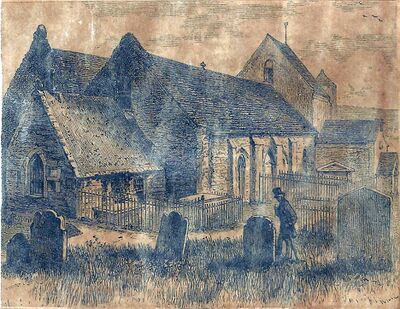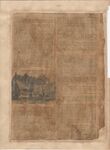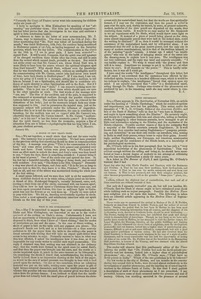< Speculations on Spiritual Agencies (continued from page 4-141) >
“Formerly the Court (of France) never went into mourning for children under six years old.’’
I have to apologise to Miss Kislingbury for speaking of her “advancing” any particular views. Her facts are irresistibly suggestive; but her letter proves that she investigates in too wise and cautious a spirit to form conclusions hastily.
A reference to dates in the letter of your correspondent, Mr. J. Carson, may be instructive. The stance was on the 18th of July; the letter mentioning that “Mr. Burt was killed off horseback during the month,” was dated Melbourne, 10th July, the accident being mentioned in Melbourne papers of 1st July, as having happened on the Saturday previous, which was the day before. The communication at the seance on the 18th is, “I am in great pain. I have been wounded”—signed Burt. It will be said, I suppose, that the spirit was still ignorant of its changed condition three weeks after the event, and still in pain from the wound which caused death, probably on the spot. But must it not strike every one that Mr. Carson’s son, whose friend Burt was, is more likely to have been the source whence the spiritual telegram sped than Burt himself? Why should Burt, without even the knowledge that he was disembodied, and, therefore, without an intelligible motive for communicating with Mr. Carson, senior (who had never even heard of him), have been drawn to Bedford-place? If I was dead, I can conceive my going (if I could) to a stranger, sitting with a medium, to tell him so, because I am a Spiritualist, and should like to contribute evidence of spirit identity to other Spiritualists still in the flesh. But if I didn’t even know that I was “dead,” I can conceive nothing more improbable. This is just one of those cases which should open our eyes to the other agencies at work. The first words of the message were “son, son.” The idea of the accident, and of the pain, is suggested to the entranced or mesmerised medium through the psychic connection between father and son. The medium feels the pain (as evinced by the distortions of his body), just as the mesmeric subject feels any sensation suggested to him. And he personates the injured man, just as the mesmeric subject will personate under the influence of suggestion. Whether this is or is not the true explanation, the case is extremely interesting, for the medium was not en rapport with Mr. Carson’s son, otherwise than through Mr. Carson himself. Is Mr. Carson “mediumistic,” or is his son? or has the former mesmeric power? It is obvious that the spirit theory, no less than the mesmeric, requires a line of attraction from son to father.—Apologising for this too long letter, I am, sir, your obedient servant.
January 6th.

What is the Intelligence?
Sir,— May I be permitted to suggest that your correspondents, Dr. Blake and Miss Kislingbury, are somewhat at sea as to the modus operandi of the writing on Slade’s slates. Unfortunately I have not had an opportunity of witnessing this particular phenomenon, but I am disposed to think, from what I know of “direct writing,” that the modes of production are one and the same. In the case of direct writing, a sheet of paper is laid on the table with any pigment you please. The medium’s hands are held, and in a few seconds—in a time scarcely sufficient to lift the paper from the table to the ceiling—the paper is found covered with writing that will take an expert quill-driver from seven to ten minutes to copy. Naturally curious to learn in what way this was effected, I asked the intelligence how it was done, as it was impossible for any ready writer to exhibit such rapid penmanship. The reply I obtained was, that writing was not obtained in the ordinary way; that the words were formed in the spirit aura (or astral fluid), and that then the paper was brought into the aura, and the words at a stroke imprinted upon it, much in the same manner as by lithography. On examining the sheets I found that, notwithstanding the writing is boldly defined, there is no impression showing at the back of the paper, as would be the case if actual pressure was brought to bear with a lead pencil upon the surface. On one or two occasions, when no colouring material was put on the table, writing came upon the paper in gilt or light bronze-coloured characters, and when the intelligence was asked whence this peculiar ink was obtained, the answer given was that it was taken from the picture frames. I am inclined to think that the intelligence does not actually hold the small piece of pencil between the slate covers with the materialised hand, but that the words are first spiritually formed, if I may use the expression, and then the pencil is willed to pass over the spot, and, during its transit, by some, at present unknown, method, particles of the slate pencil are deposited on the words, thus rendering them visible. It would be an easy matter for Mr. Simmonds to try an experiment with Dr. Slade, which would throw some light on the subject. If, instead of a piece of pencil being placed on the slate, some almost impalpable pencil-dust were laid in the locked slate, could the writing be obtained? If so, then it would be managed without the assistance of the materialised hand, and by will-power alone. I am convinced that the will is the great motive power, and the only one in many of modern manifestations, let it be that of the medium himself, or of the assisting “spook” outside. A winter ago I asked “an intelligence,” who was in the habit of bringing stones out of the street into the drawing-room, to explain how it was done. The intelligence was not very cultivated, and the reply was brief and scarcely scientific. “I can hardly explain it. We wrap it round with ‘the power,’ and then will it to come. Sometimes we manage to get it to follow us; at other times we can’t. It all depends on ‘the power.’” This is hardly satisfactory, but it was all I could get.
I have used the words “the intelligence” throughout this letter, but in all cases I am convinced that the operations were effected by disembodied spirits, because in a hundred different ways, which it would be too tedious to explain, “the intelligence” forced that opinion upon my mind. I am equally convinced that “Allie” is a disembodied spirit, acting through Dr. Slade. Perhaps nine-tenths of the phenomena are produced by her; in the remaining tenth she may assist others to communicate.
Hindu Psychology
Sir,—There appears in The Spiritualist, of November 28th, an article under the heading of “Hindu Psychology,’’ which for combined egotism and impertinence can have but few parallels. This writer, under the signature of “W. L. D. O‘Grady, Editor of the American Builder, and late of the Bank of Madras,” tells us that he “was born in Madras.., and ought to know something about the Hindus.” He certainly ought, and deeply do I sympathise with him and others who, toiling as banking clerks, or engaging in other business pursuits, have managed to get so little real information relating to the Hindus, and the mysteries of the Hindu religions. Possibly another reason of this is the antipathy that a majority of the Hindus entertain towards Englishmen. It is well known that they consider beef-eating Englishmen—“pompous, presuming, and dictatorial,” to use their own words—as intruders, who, coming to India to stuff their purses, return home to enjoy their gains. Accordingly, neither Englishmen, nor European, nor American missionaries can expect to get the confidence of the Hindu heart, or a knowledge of his psychological mysteries.
Mr. O‘Grady tells us in his first paragraph that he has only a “very superficial knowledge of the phenomena of Spiritualism.” This was evident enough without the telling, and being so, he should have manifested at least a decent degree of modesty in his attempt at criticizing one who has made Spiritualism a study for many years.
In a letter to The Banner of Light, I said (quoting Mr. O‘Grady’s version) that I had
Spent day after day with Hindu Pundits and Shastrys, with the Brahmans and Sivaitas. 2. That he has seen their mediums, their devil-priests, and their Guros. 3. That he has seen the media entranced, and seen them cast out demons. 4. That he has procured, not only their camphor mixture, but other incense preparations, as well as the genuine “Soma-juice” plant, etc., etc....
I affirm, without the slightest fear of contradiction, that each and all of these assertions are without warrant of fact.
Not only do I squarely contradict you, sir, but tell you besides, Mr. O’Grady, that the blush of shame ought to have crimsoned your cheek while inditing such an unjust paragraph. Possibly the Madras Times may enlighten you a bit upon this matter. The following is taken from an editorial article appearing in the Madras Times of September 1st:—
Three weeks ago we announced the arrival in Madras of' Dr. J. M. Peebles, formerly an American Consul in Asiatic Turkey, and the author of several books. During the period that he has been in Madras he has been most industrious in obtaining information from all sources, and the chapters of his forthcoming work, devoted to Southern India, should be most interesting.... The Doctor, during his short stay here, has exhibited that push and energy which is characteristic of Americans. Though he has been, as we have said, hardly three weeks in Madras, he has managed to visit the famine camps, the Leper Hospital, the Museum, libraries, all the public buildings and burning ghauts. He has witnessed the clever feats of magicians, seen the devil-priests professedly cast out demons, looked into a higher class of psychological phenomena, difficult to get at and more difficult to comprehend, and met a good many native gentlemen of various castes. He has also received from the Chief Secretary to Government much kindness in the way of a sight of public documents, and in every conceivable way has had the opportunity of seeing all sides of our social life. Dr. Peebles was at the breakfast in the Banqueting Hall yesterday, in honour of the Viceroy, and was charmed with the almost Republican freedom evinced.
The reader will observe that this gentlemanly editor of the Times informs the public that “Dr. Peebles had seen the devil-priests professedly cast out demons, looked into a higher class of psychological phenomena,” etc., etc.; while Mr. O’Grady says, “They have no devil-priests in India.” Which of the two gentlemen is to be believed?
My few weeks in the city of Madras, and ten months in the country during this second visit to India, were devoted almost exclusively to the investigation of psychic phenomena, and the hunting up of noted marvel-workers in the extreme South of India, In due time I shall publish a description of such of these phenomena as I am permitted. I say permitted, because some of them occurred under the promise and seal of secrecy. Others, less startling, occurred in the presence of several <... continues on page 4-143 >
Editor's notes
Sources
-
London Spiritualist, No. 281, January 11, 1878, p. 20


